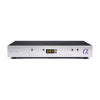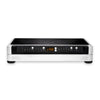Broken by BAD
Do NOT Demo the Berkeley Audio Design Alpha Reference DAC
Bill Rudolph has made a big mistake.
The Upscale Audio sales associate based in Eugene, OR, was perfectly happy with his Berkeley Audio Design Alpha DAC Series 3.
Like all great DACs, the $10,995 Alpha takes two different sonic qualities that are all but irreconcilable in cheaper DACs. Take DAC #1, which has a warm sound full of harmonic richness. It does beautifully when the track is a solo voice and guitar but gets a little congested when the rest of the band kicks in.
DAC #2 is clean and detailed, but like a charcoal rubbing of a gravestone, gives you mainly the "tops" of the sound. So, though you can count the number of background singers, and hear that triangle way at the back of the studio, the overall presentation feels cold and calculated.
Great DAC brands can take the best of DAC #1 and #2 and make something even better; but to do so, the designers have to have great faith in our ear-brain system, and go far, far beyond what the Nyquist frequency tells us. Berkeley Audio Design relentlessly optimizes power supplies, analog stages, digital filters, and layout down to how many millimeters separate the clock from the other circuits. They make changes so minute that lab instruments can barely measure them, and yet, we can hear them reliably and repeatably.
Better than Best
Have you ever got your system to a point where you are so happy that you can't even imagine how it could improve? And then, your audiophile friend or friendly 60-day-return hi-fi store gets you to try something new, and there's such an improvement that your brain has to rewrite its own code?
Bill was delighted with the Alpha DAC, but then he made the mistake of getting on the list for our demo Alpha Reference, the $28,000 jewel of Berkeley Audio Design's famously tightly curated three-product offering.
(An aside, we have a constantly circulating stream of demo gear so that our remote salespeople can experience the products they sell.)
"The Berkeley Alpha Reference DAC is exponentially better in my system," says Bill. "The best way to describe what I heard is to liken it to what a REL does to a system. Every frequency has more weight, detail, and spatial information... way closer to analog."
A Final Warning
Now, if you're thinking this praise of the Alpha Reference doesn't make the regular Alpha look good, you must know that critics often compare the $28,000 Alpha Reference with DACs in the six-figure pricepoint. Both models of Berkeley DACs compete in far more rarified air than the prices would lead you to believe.
Bill, meanwhile, has been in audio for a long time and helped develop a new line of cartridges when he worked at Sumiko, so not only does he know good sound, but he's not easily impressed. And yet, he has got himself in a place where, as he puts it, "I cannot un-hear the Reference DAC."
So, we end this edition of Warehouse Treasures with a strong caution: unless you are very sure you can actually bring one of these home, do not call one of our friendly and knowledgeable salespeople to set up a demo of either the Berkeley Audio Design Alpha DAC or the Alpha Reference. Do not click on the links below; go straight to the next story.
 |
 |
|
Berkeley Audio Design Alpha DAC Series 3 $10,995.00 |
Berkeley Audio Design Alpha DAC Reference Series 3 |
Get This Amp up to 88 Miles per Hour
Leave the DeLorean in the garage. This 1985 iconic class-A amp is back to the present.
Our first shipment of the new Musical Fidelity A1 integrated amp sold out in record time, snapped up by hi-fi enthusiasts who knew and loved previous iterations of this quiet classic.
With our second shipment now in the warehouse, this is the chance for a more considered buyer—who might not be aware of this amp's glorious past—to read up and join the A1 fan club.
The A1 is a 25 W per channel amp, which doesn't sound like much. But it is a pure class-A design, and the first version, released in 1985, made waves for being an absolute beast when it came down to driving some of the most difficult speakers of that time. As Kevin says, "You cannot power your way to better sound. You get there using better parts."
Based on its huge success, the A1 has gone through multiple reissues and new versions over the years. New for 2023, Musical Fidelity preserved the specifications, appearance, and circuits of the 1985 rendition for those who missed out the first time. Inside, though, it has been updated with a new transformer, power supplies, and modern low-noise components.
Class-A operation means this amp is going full tilt all the time, with power being released as needed into the speaker taps. Think of a car with its engine running constantly at 6,000 RPM, with you controlling the speed with only a clutch. Sounds like that would be lively and dynamic? Yes, it is. Sounds like it'll get kind of hot? Yes, which is why the entire top of the A1 is a heatsink, and it is going to get hot enough for you to get worried and call us. But that's just the heat dissipation doing its job, and once you've stopped worrying and opened up a pack of bacon, you will truly appreciate the wonderful openness and engagement that class-A topologies bring. (Our lawyers require us to clearly state we are joking about the bacon.)

New Video: Kevin Puts Tannoy and Fyne Loudspeakers Side by Side
Kevin talks about the Tannoy Stirling III LZ SE review in What Hi-Fi? and the review of the Fyne Audio Vintage Classic X and the Vintage Classic XII. Tannoy and Fyne Audio have a history in the UK, as the former leadership team from Tannoy founded Fyne Audio. Dr. Paul Mills (who designed many Tannoy speakers) now designs Fyne Audio products.


